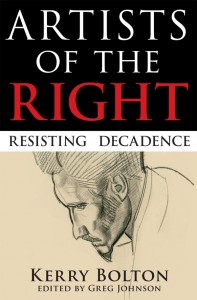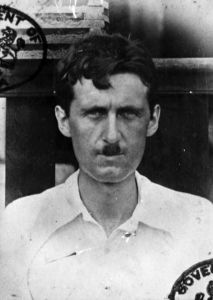Orwell and the Crocodile Ladies
Posted By Margot Metroland On In North American New Right | Comments Disabled1,255 words
When did Eric A. Blair, a.k.a. George Orwell, lose his virginity? Most biographers haven’t wrestled much with this particular issue. But then came along John Sutherland, a retired academic who published an entertaining book called Orwell’s Nose: A Pathological Biography back in 2016. (I briefly described this cute volume in a 2019 end-of-year Favorite Books [2] wrap-up.)
John Sutherland, bless his soul, spends about half his book reconstructing the carnal history of E. A. Blair. He dredges up hints and testimony from various friends and unrequited loves. But some of the best clues come from Orwell’s novels and autobiographical passages. One of them is a painful memory recalled in the second half of The Road to Wigan Pier [3]. Orwell is thinking of the time when he was in the Imperial Police in Burma, and one of his sub-inspectors was beating a suspect. An American missionary was nearby, looking on:
The American watched it, and then turning to me, said thoughtfully, “I shouldn’t care to have your job.” It made me horribly ashamed. So that was the kind of job I had! Even an ass of an American missionary, a teetotal cock-virgin from the Middle West, had the right to look down on me and pity me!
“A teetotal cock-virgin from the Middle West”! That’s such a wonderful, Orwellian sneer. Full of anger at the hick holy-joe missionary, who by rights should be a couple of rungs down the status ladder from Orwell . . . and yet he deigns to pity him. After all, Eric Blair, Old Etonian and young officer of the Imperial police, has good reason to believe himself a man of the world. He can hold his liquor and almost certainly is no cock-virgin.
Orwell doesn’t give us a date for this encounter with the missionary, but we can be certain he was in his early twenties. The timeline of his Burma career is pretty clear. He sailed out there when he was 19, passing from Rangoon to Mandalay for training; then returning to the Rangoon area two years later at the end of 1924, when he was 21. In early 1928, not quite 25, Orwell returned to England on leave and decided to “chuck” his awful job in Burma.
Writes John Sutherland in Orwell’s Nose,
[Orwell] confided to his Eton friend Harold Action in later life that in Burma he had got all the sex he didn’t get in England: from the “Jewish whores with crocodile faces” in Rangoon, one supposes, to exquisitely aromatic doll-like live-in concubines in remote up-country stations.[1] [4]
Where does this reference to “Jewish whores with crocodile faces” actually come from? Sutherland is imputing it from Orwell’s first novel, Burmese Days — an imputation I find credible. The protagonist stand-in for Orwell here in the novel is Mister Flory, an employee of a timber firm. Orwell’s mother’s family, as it happens, were teak merchants in Burma, and Flory, like Orwell, sailed to Burma when not quite 20:
His first six months in Burma he had spent in Rangoon, where he was supposed to be learning the other side of his business. He had lived in a “chummery” with four other youths who devoted their entire energies to debauchery. And what debauchery! They swilled whisky which they privately hated, they stood round the piano bawling songs of insane filthiness and silliness, they squandered rupees by the hundred on aged Jewish whores with the faces of crocodiles.[2] [5]
 [6]
[6]You can buy Kerry Bolton’s Artists of the Right here [7].
We might therefore conclude that Superintendent E. A. Blair of the Imperial Police may have first “read the book” (as the old expression went) with an “aged Jewish whore” in Rangoon.
Granted, age perception is variable and subjective, and a wench of 37 with a thickly-painted face might look quite old when up close to a lad of 20. Regardless, this story from Orwell’s first novel, Burmese Days, seems to explain a mysterious and intrusive episode that suddenly appears in his last, Nineteen Eighty-Four [8].
There we find 39-year-old Winston Smith writing in his diary and remembering a whore he once picked up on the street. Supposedly this had happened just a few years before, but it seems more like a callow young man’s early adventure than the idle wandering of a married man in his mid-thirties:
It was three years ago. It was on a dark evening, in a narrow side-street near one of the big railway stations. She was standing near a doorway in the wall, under a street lamp that hardly gave any light. She had a young face, painted very thick. It was really the paint that appealed to me, the whiteness of it, like a mask, and the bright red lips. Party women never paint their faces. There was nobody else in the street, and no telescreens. She said two dollars. I —
He drew his breath and went on writing:
I went with her through the doorway and across a backyard into a basement kitchen. There was a bed against the wall, and a lamp on the table, turned down very low. She —
. . . He seemed to breathe again the warm stuffy odour of the basement kitchen, an odour compounded of bugs and dirty clothes and villainous cheap scent, but nevertheless alluring, because no woman of the Party ever used scent, or could be imagined as doing so . . . In his mind the smell of it was inextricably mixed up with fornication . . .
She threw herself down on the bed, and at once, without any kind of preliminary in the most coarse, horrible way you can imagine, pulled up her skirt . . . I turned up the lamp. When I saw her in the light —
. . . What he had suddenly seen in the lamplight was that the woman was old. The paint was plastered so thick on her face that it looked as though it might crack like a cardboard mask . . . She had no teeth at all . . .
When I saw her in the light she was quite an old woman, fifty years old at least. But I went ahead and did it just the same.
Here Orwell offers us the eroticism of bad smells and insalubrious surroundings, which I am reliably informed have a mysterious appeal for certain people. The harlot’s toothlessness doesn’t seem to jibe with my mental picture of Rangoon crocodile ladies, who I naturally imagine should have had big, sharp teeth. But maybe one of Orwell’s early good-time girls had “taken her teeth out”? Or perhaps “crocodilian appearance” meant something more to him beyond sharp, protuberant dentition? Bony jaw, leathery skin, maybe?
It doesn’t matter. This pairing of the whores in Orwell’s first and last novels, Burmese Days and Nineteen Eighty-Four, would be no more than an idle whimsy if Orwell’s writings regularly dealt with ladies of the pavement. But his writings do not. Neither do the known facts of his life. In his last 15 years he was married to two attractive, genteel, and educated women: Eileen O’Shaughnessy, a graduate of Oxford and London University, who died of a botched hysterectomy in 1945; and afterwards Sonia Brownell, a subeditor at Cyril Connolly’s Horizon. In his bachelor days he’d been known to make the occasional furtive pass at a female acquaintance, but there are no reports of him consorting with prostitutes — after his early days in Burma, with the crocodile ladies. I therefore conclude that the ancient prostitute in his last novel, Nineteen Eighty-Four, is no more than a reincarnation of the one — or ones — he recalled in his first novel, Burmese Days.
* * *
Like all journals of dissident ideas, Counter-Currents depends on the support of readers like you. Help us compete with the censors of the Left and the violent accelerationists of the Right with a donation today. (The easiest way to help is with an e-check donation. All you need is your checkbook.)
For other ways to donate, click here [9].
Notes
[1] [10] John Sutherland, Orwell’s Nose: A Pathological Biography (London: Reaktion Books Ltd., 2016).
[2] [11] George Orwell, Burmese Days, first published in 1934. Online here [12].
